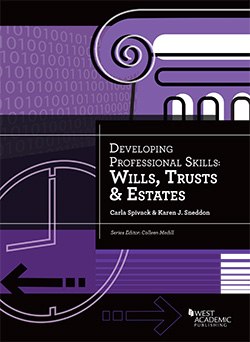- Home
- Developing Professional Skills: Wills, Trusts & Estates
Developing Professional Skills: Wills, Trusts & Estates
The Trusts & Estates book in the Developing Professional Skills series facilitates the incorporation of a wide range of practical legal skills into the trusts and estates classroom to promote student learning. Each assignment draws upon key doctrinal concepts, such as donative freedom, intestacy, will execution and revocation, construction, trust creation & revocation, fiduciary duties, prenuptial agreements, will substitutes, charitable giving, and guardianship. It also seeks to give students a footing in some of the more basic tasks an estate planning attorney would perform, such as explaining succession law to non-lawyers, planning to avoid will contests, locating intestate heirs, etc. Students have the opportunity to develop and refine the following skills in the context of estate planning:
- Composing legal letters and professional emails
- Writing court petitions, interrogatories, and charitable gift agreements
- Developing counseling plans and best practices guidance
- Conducting a negotiation
- Engaging in client counseling
- Creating community presentations
Secondarily, this book also incorporates social issues that are inherent in the study and practice of estate planning. These issues revolve around the role of estate planning and succession law in perpetuating wealth inequality. Many of the assignments touch upon these issues; it is of course up to the professor how much to draw them out and emphasize them. Each assignment is complete and effective even without emphasis on these issues. However, they add a worthwhile dimension to the book.
The accompanying Teacher’s Manual includes teaching tips, practice norms, legal ethics points, assessment guidance (including the inclusion of rubrics), and additional assignments for each chapter. Where appropriate, it also expands upon the social issues appearing in the assignment.
Imprint: West Academic Publishing
Series: Developing Professional Skills
Publication Date: 06/24/2022
Related Subject(s): Lawyering Skills, Professional Identity Formation
Carla Spivack, Albany Law School
Karen J. Sneddon, Mercer University School of Law
CasebookPlus™
This title is available in our CasebookPlus format. CasebookPlus provides support beyond your classroom lectures and materials by offering additional digital resources to you and your students. Anchored by faculty-authored formative self-assessments keyed to our most popular casebooks, CasebookPlus allows students to test their understanding of core concepts as they are learning them in class – on their own, outside of the classroom, with no extra work on your part. CasebookPlus combines three important elements:
- A new print or digital casebook
- Access to a downloadable eBook with the ability to highlight and add notes
- 12-month access to a digital Learning Library complete with:
- Chapter questions keyed to the casebook
- Black Letter Law questions (available in select subjects)
- Subject area review questions for end of semester use
Leading digital study aids, an outline starter, and audio lectures in select subjects
Students can still utilize CasebookPlus digital resources if they’ve purchased a used book or are renting their text by purchasing the Learning Library at westacademic.com.
With CasebookPlus, you can customize your students’ learning experience and monitor their performance. The quiz editor allows you to create your own custom quiz set, suppress specific quiz questions or quiz sets, and time-release quiz questions. Additionally, the flexible, customized reporting capability helps you evaluate your students’ understanding of the material and can also help your school demonstrate compliance with the new ABA Assessment and Learning Outcomes standards.
Learn more about this series.
Access Denied
Law School Faculty - Sign in or Create an Account to access this content. Law faculty who have created an account can sign in after receiving email notification that registration has been approved. Email accountmanager@westacademic.com or call 800-313-9378 for assistance.
Other Higher Education Faculty who wish to access digital review copies or teaching resources should contact their West Academic Account Manager at college@westacademic.com or 800-360-9378.
Adopters Only
This content is intended for adopters only. Sign in or Create an Account to access this content. Law faculty who have created an account can sign in after receiving email notification that registration has been approved. If you are an adopter who is unable to access this content after signing in, contact your account manager for assistance at accountmanager@westacademic.com or call 800-313-9378 for assistance.
Access Denied
Sign in or Create an Account to access this content. Faculty who have created an account can sign in after receiving email notification that registration has been approved. Contact us for assistance.
Law School Faculty: email accountmanager@westacademic.com or call 800-313-9378.
Other Higher Education Faculty: email college@westacademic.com or 800-360-9378.
Access Denied
Higher education faculty who wish to view this document should contact their West Academic Account Manager at college@westacademic.com or 800-360-9378.
